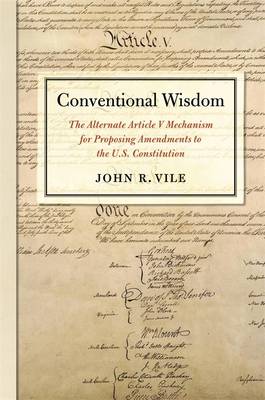
- Afhalen na 1 uur in een winkel met voorraad
- Gratis thuislevering in België vanaf € 30
- Ruim aanbod met 7 miljoen producten
- Afhalen na 1 uur in een winkel met voorraad
- Gratis thuislevering in België vanaf € 30
- Ruim aanbod met 7 miljoen producten
Zoeken
Conventional Wisdom
The Alternate Article V Mechanism for Proposing Amendments to the U.S. Constitution
John R. Vile
Hardcover
€ 65,95
+ 131 punten
Omschrijving
Article V of the US Constitution allows two-thirds majorities of both houses of Congress to propose amendments and a three-fourths majority of the states to ratify them. John Vile surveys two centuries of scholarship on Article V and concludes that states and Congress have the legal right to limit the scope of such conventions to a single subject.
Specificaties
Betrokkenen
- Auteur(s):
- Uitgeverij:
Inhoud
- Aantal bladzijden:
- 288
Eigenschappen
- Productcode (EAN):
- 9780820349008
- Verschijningsdatum:
- 1/03/2016
- Uitvoering:
- Hardcover
- Afmetingen:
- 152 mm x 229 mm
- Gewicht:
- 520 g

Alleen bij Standaard Boekhandel
+ 131 punten op je klantenkaart van Standaard Boekhandel
Beoordelingen
We publiceren alleen reviews die voldoen aan de voorwaarden voor reviews. Bekijk onze voorwaarden voor reviews.











